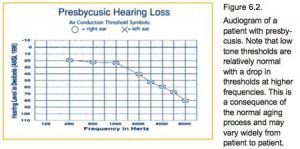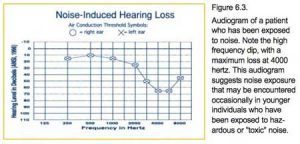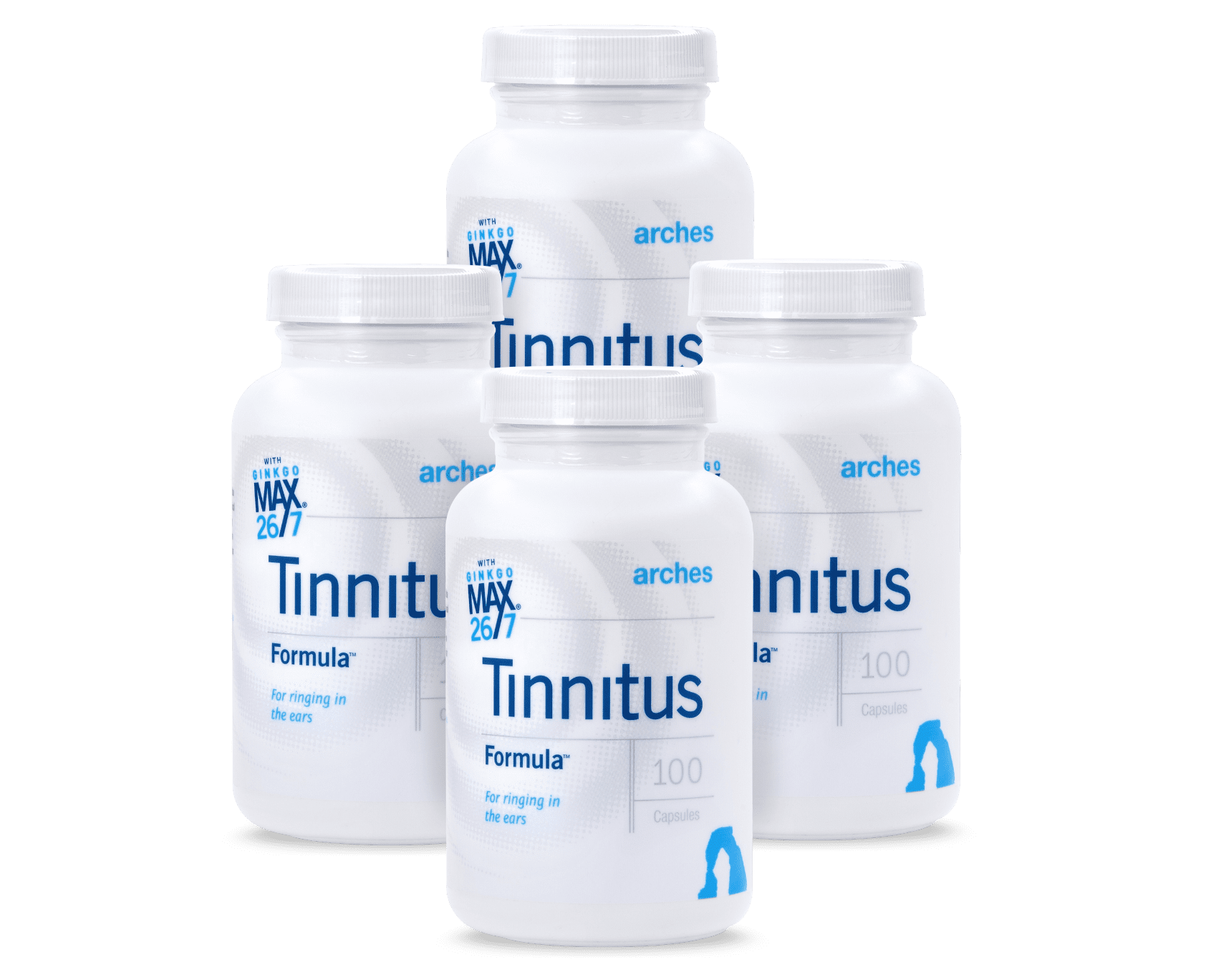By Barry Keate
Barry Keate, has lived with tinnitus over 40 years and has published 150+ research articles on numerous aspects of tinnitus. He is an expert on the condition and a well-known advocate for those with tinnitus.
Presbycusis is hearing loss due to aging. It is the cumulative effect of aging on hearing and can be worsened by other factors, including noise exposure, toxic medications, and several disease conditions.

Presbycusis typically appears in both ears as high frequency hearing loss, then gradually encroaches on the lower frequencies. Eventually it brings difficulty in speech discrimination and auditory processing. It can begin very early in life; even young adults begin to lose the ability to hear high frequencies, above 15 or 16 KHz. About 30-35% of adults between 65 and 75 years have some degree of hearing loss in the speech frequencies. After age 75, this increases to 40-50%.
Presbycusis affects men more than women, and tinnitus accompanies it in many cases. In fact, hearing loss is the leading cause of tinnitus. One study found that 11% of people with presbycusis have tinnitus. (1)
Factors Responsible for Presbycusis
- Heredity may contribute to early aging of the cochlea and susceptibility of the cochlea to drug insults.
- Atherosclerosis diminishes blood flow to the cochlea, reducing the oxygen supply.
- Eating saturated fats may accelerate atherosclerosis.
- Diabetes reduces blood supply to the cochlea.
- Noise trauma can hasten presbycusis.
- Smoking accentuates atherosclerotic changes, aggravating presbycusis.
- Hypertension reduces the cochlea’s blood supply.
- Ototoxic medications hasten the progress of presbycusis.
Audiograms: Presbycusis and Noise-Induced Hearing Loss
As shown in the audiogram below, pr esbycusis begins with hearing loss in higher frequencies and progresses, over years, to include speech frequencies (between 300 and 3,400 Hz).
esbycusis begins with hearing loss in higher frequencies and progresses, over years, to include speech frequencies (between 300 and 3,400 Hz).
The audiogram below shows hearing loss due to noise exposure. The decline in hearing starts at the frequency where the noise was strongest. After worsening to a certain point, it starts to improve. This slope will not change, unless more noise causes further damage.

Michael Seidman, MD, has conducted extensive research into the causes, prevention, and treatment of presbycusis. In a May 2006 study, published in the journal Laryngoscope, he posits that the mitochondrial clock theory of aging is the basis for presbycusis. (2)
Mitochondria exist in large numbers in most cells of the human body. They produce about 98% of the body’s energy by burning fatty acids to produce the molecule adenosine triphosphate (ATP), which cells use for energy.
According to Dr. Seidman’s study, most presbycusis cases include reduced blood flow to the cochlea. This causes free radicals to form, affecting inner ear tissues and damaging mitochondrial DNA. Damage to mitochondrial DNA causes chromosomes to mutate, contributing to both aging and presbycusis.
In the Health Professionals Follow-Up study, begun in 1986, 26,273 male health professionals were analyzed for their intake levels of several vitamins, including folate, which is found in green, leafy vegetables and most B12 supplements. This study found that men over 60, whose folate intake from food and supplements was among the highest 20% of participants, were 21% less likely than those in the bottom 20% to develop presbycusis. (3)
Vitamin B12 is also necessary for the proper functioning of the auditory system. A major study of tinnitus among Israeli military personnel clearly showed a relationship between B12 deficiency and auditory pathway dysfunction. Improvement in tinnitus and associated complaints were observed in patients after B12 replacement therapy. (4)
Recently, researchers have found a connection between presbycusis and reduced cognitive function, cognitive impairment, and dementia. They found presbycusis to be a biomarker and risk factor for cognitive impairment, declines in cognition, and dementia, but not for Alzheimer’s disease, which has other biological causes. (5)
Arches Tinnitus Combo Pack
Arches Tinnitus Combo Pack™ includes a three-month supply of all Arches Products.
Arches Tinnitus Formula® with Ginkgo Max 26/7® is our proprietary Ginkgo biloba-based product. Ginkgo increases blood flow to the cochlea; is a powerful antioxidant, countering free radicals; and improves cognition.
Arches Tinnitus Stress Formula® is a high concentration of B vitamins, which are necessary for proper auditory function and help reduce stress levels.
Arches Tinnitus B12 Formula® contains folic acid and vitamin B12 in the form of methylcobalamin, the only form that is immediately available for use by the body. Both B12 and folic acid are necessary for the prevention and possible reversal of presbycusis.
Get Arches Tinnitus Combo Pack and improve your ability to prevent presbycusis, reduce tinnitus, and increase your cognitive abilities.
References:
1 – Podoshin L, Ben-David J, Teszler CB. Pediatric and Geriatric Tinnitus. Int Tinnitus J. 1997; 3(2):101-103.
2 – Seidman MD. Effects of Dietary Restriction and Antioxidants on Presbycusis. Laryngoscope 2000 May; 110(5Pt 1):727-38.
3– Shargorodsky J, Curhan SG, Eavey R, Curhan GC. A Prospective Study of Vitamin Intake and the Risk of Hearing Loss in Men. Otolaryngol Head Neck Surg. 2010 Feb; 142(2):231-6.
4 – Shemesh Z, Attias J, Oman m, Shapira N, Shahar A. Vitamin B12 Deficiency in Patients with Chronic Tinnitus and Noise-Induced Hearing Loss. Am J Otolarygol. 1993 Mar-Apr; 14(2):94-9.
5 – Loughrey DG, Kelly ME, et al. Association of Age-Related Hearing Loss with Cognitive Function, Cognitive Impairment, and Dementia. JAMA Otolarygol Head Neck Surg. 2018; 144(2):115-126.
Get Free Shipping!
Order now and get free shipping on either the Tinnitus Starter Kit or Combo Pack. Try the doctor recommended products with clinically proven ingredients for tinnitus. No coupon code required.


